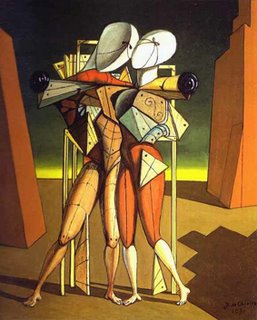
"A cyborg is a cybernetic organism, a hybrid of machine and organism, a creature of social reality as well as a creature of fiction.
Contemporary science fiction is full of cyborgs - creatures simultaneously animal and machine, who populate worlds ambiguously natural and crafted. Modern medicine is also full of cyborgs, of couplings between organism and machine, each conceived as coded devices, in an intimacy and with a power that was not generated in the history of sexuality. Cyborg 'sex' restores some of the lovely replicative baroque of ferns and invertebrates (such nice organic prophylactics against heterosexism). Cyborg replication is uncoupled from organic reproduction...I am making an argument for the cyborg as a fiction mapping our social and bodily reality and as an imaginative resource suggesting some very fruitful couplings.
By the late twentieth century, our time, a mythic time, we are all chimeras, theorized and fabricated hybrids of machine and organism; in short, we are cyborgs. Ths cyborg is our ontology; it gives us our politics. The cyborg is a condensed image of both imagination and material reality, the two joined centres structuring any possibility of historical transformation. In the traditions of 'Western' science and politics - the tradition of racist, male-dominant capitalism; the tradition of progress; the tradition of the appropriation of nature as resource for the productions of culture; the tradition of reproduction of the self from the reflections of the other - the relation between organism and machine has been a border war. The stakes in the border war have been the territories of production, reproduction, and imagination.
The cyborg is a creature in a post-gender world; it has no truck with bisexuality, pre-oedipal symbiosis, unalienated labour, or other seductions to organic wholeness through a final appropriation of all the powers of the parts into a higher unity. In a sense, the cyborg has no origin story in the Western sense - a 'final' irony since the cyborg is also the awful apocalyptic telos of the 'West's' escalating dominations of abstract individuation, an ultimate self untied at last from all dependency, a man in space. An origin story in the 'Western', humanist sense depends on the myth of original unity, fullness, bliss and terror, represented by the phallic mother from whom all humans must separate, the task of individual development and of history, the twin potent myths inscribed most powerfully for us in psychoanalysis and Marxism...The cyborg skips the step of original unity, of identification with nature in the Western sense.
The cyborg is resolutely committed to partiality, irony, intimacy, and perversity. It is oppositional, utopian, and completely without innocence. No longer structured by the polarity of public and private, the cyborg defines a technological polls based partly on a revolution of social relations in the oikos, the household. Nature and culture are reworked; the one can no longer be the resource for appropriation or incorporation by the other. The rela-tionships for forming wholes from parts, including those of polarity and hierarchical domination, are at issue in the cyborg world. Unlike the hopes of Frankenstein's monster, the cyborg does not expect its father to save it through a restoration of the garden; that is, through the fabrication of a heterosexual mate, through its completion in a finished whole, a city and cosmos. The cyborg does not dream of community on the model of the organic family, this time without the oedipal project. The cyborg would not recognize the Garden of Eden; it is not made of mud and cannot dream of returning to dust...Cyborgs are not reverent; they do not re-member the cosmos. They are wary of holism, but needy for connection - they seem to have a natural feel for united front politics, but without the vanguard party. The main trouble with cyborgs, of course, is that they are the illegitimate offspring of militarism and patriarchal capitalism, not to mention state socialism. But illegitimate offspring are often exceedingly unfaithful to their origins. Their fathers, after all, are inessential."
From The Cyborg Manifesto by Donna Haraway
Andy Warhol Self-Portraits - (ed.) Dietmar Elger
Andy Warhol - (ed.) Annette Steiner
Art in its Time: Theories and Practices of Modern Aesthetics - Paul Mattick
Cindy Sherman - Rochelle Steiner
The Cult of the Avant-Garde Artist - Donald Kuspit
The Death of the Author - Roland Barthes
Doll Parts: Technology and the Body in 'Ghost in the Shell' - Susan Napier
Magical Girls and Atomic Bomb Sperm: Japanese Animation in America - Annalee Newitz
Making Up People - Ian Hacking
Revisionary Film - Sean Cubitt
The Question of Lay-Analysis - Sigmund Freud
Pop Trickster Fool: Warhol Performs Naivete - Kelly M. Cresap
Truth and Power - (interview with) Michel Foucault
Understanding Foucault - Geoff Danaher, Tony Schirato and Jen Webb
What is an Author? - Michel Foucault
The Work of Andy Warhol - (ed.) Gary Garrels
Would the Real Cindy Sherman Please Stand Up? Encounters between Cindy Sherman and Feminist Art Theory - Michelle Meagher
Viewing:
The Celluloid Closet - d. Rob Epstein and Jeffrey Friedman (1995)
Ghost in the Shell - d. Mamoru Oshii (1995)
Rocco e i suoi fratelli (Rocco and His Brothers) - d. Luchino Visconti (1960)
Tarnation - d. Jonathon Caouette (2003)